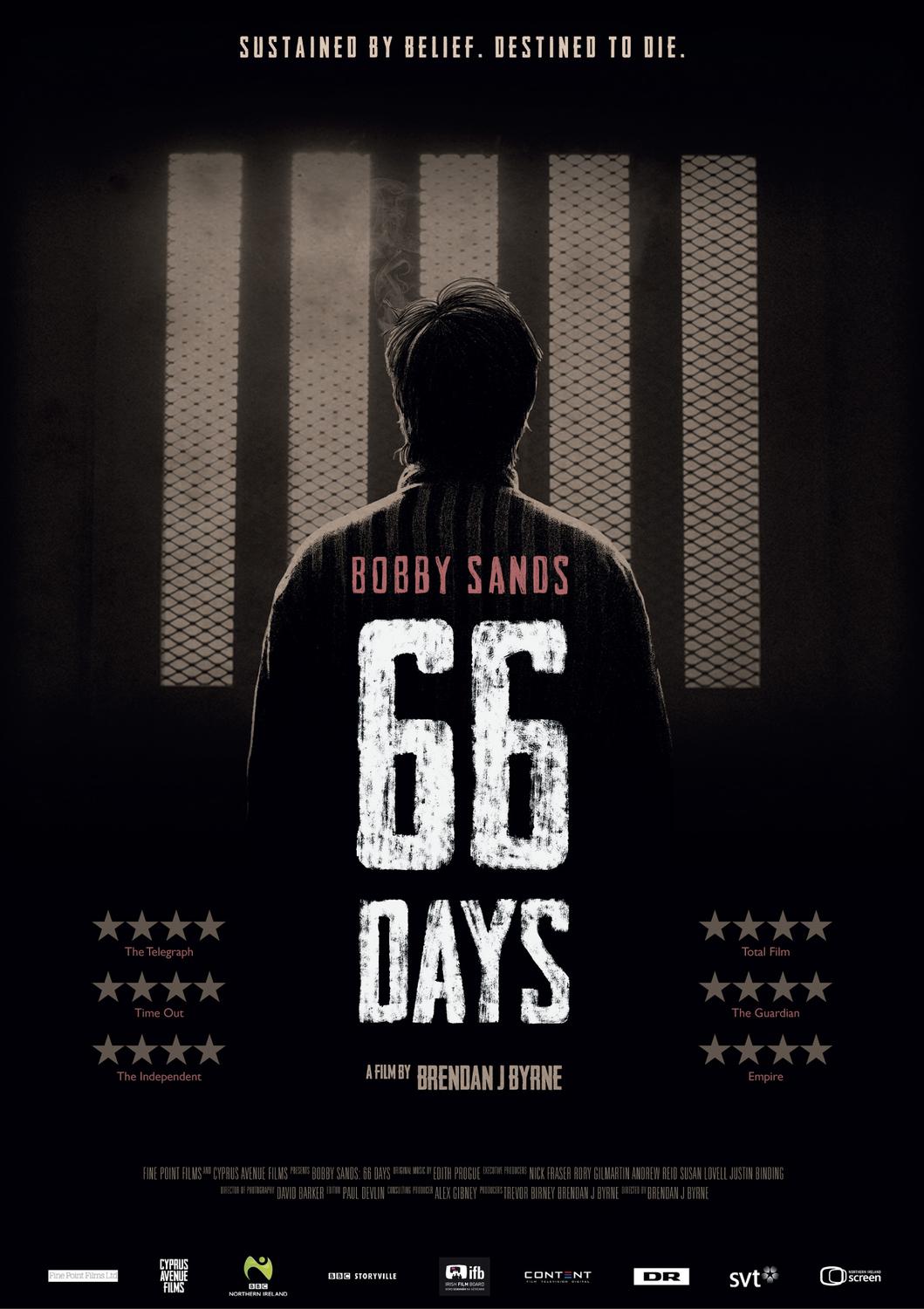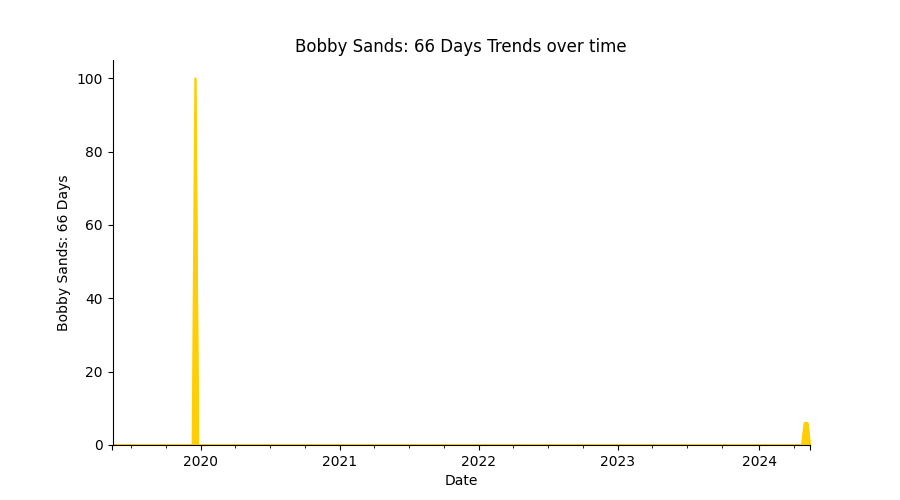
 Story & Synopsis
Story & Synopsis
In the documentary “Bobby Sands: 66 Days,” directed and written by Brendan J. Byrne, viewers are taken on a poignant journey through the 66-day hunger strike of Bobby Sands in the spring of 1981. The film delves into Sands’ harrowing experience using excerpts from his diary, testimonies, and archival footage.
Throughout the documentary, the audience gets a glimpse into the life and struggles of Bobby Sands, a member of the Irish Republican Army (IRA) who embarked on a hunger strike to protest against the British government’s treatment of political prisoners. Sands’ act of defiance and sacrifice became a symbol of resistance and garnered global attention.
The narrative is not only centered on Sands himself but also features insights from journalists, historians, sociologists, medical experts, and individuals who were acquainted with Sands. Their perspectives provide a comprehensive understanding of the socio-political climate during that tumultuous period in Northern Ireland.
The film sheds light on the dehumanization of Sands by both the government, which portrayed him as a mere criminal deserving punishment, and the IRA, which sought to elevate him as a symbol of the cause. Despite these attempts to strip Sands of his humanity, “Bobby Sands: 66 Days” endeavors to present a balanced portrayal of the man behind the iconic figure.
As the audience witnesses Sands’ physical deterioration over the course of his hunger strike, the emotional impact of his sacrifice becomes palpable. The documentary captures the profound effect of Sands’ actions on those around him and the wider Irish community.
Byrne’s direction skillfully navigates the complexities of Sands’ story, offering a compelling and thought-provoking exploration of a pivotal moment in Irish history. “Bobby Sands: 66 Days” serves as a tribute to Sands’ unwavering commitment to his beliefs and his enduring legacy as a symbol of resistance.
 Cast & Crew
Cast & Crew
| Actor | Role |
|---|---|
| Martin McCann | |
| Fintan O’Toole | |
| Charles Moore | |
| Richard English | |
| Norman Tebbit | |
| Tim Pat Coogan | |
| Dessie Waterworth | |
| Gerry Adams |
 Reviews and feedback
Reviews and feedback
Lights, camera, hunger strikes! Get ready for a cinematic rollercoaster as we delve into the heart-wrenching and politically charged documentary, “Bobby Sands: 66 Days.”
Imagine a mix of suspense and historical drama so intense that it leaves you on the edge of your seat, pondering the sacrifices made for a cause. Director Brendan Byrne takes us on a thought-provoking journey through the life and death of Bobby Sands, a figure whose legacy still resonates decades later.
The film doesn’t shy away from the complexities of Sands’ story. It skillfully weaves together interviews and archival footage to paint a vivid picture of a man whose unwavering commitment to his beliefs led to an ultimate sacrifice.
Plot:
The narrative unfolds like a gripping novel, with each passing day of Sands’ hunger strike intensifying the emotional turmoil. From his initial days in prison to the harrowing final moments, every scene is crafted with precision to evoke empathy and admiration for Sands’ unwavering resolve.
Themes and Tone:
The themes of resistance, sacrifice, and political turmoil are intricately woven into the fabric of the film. As Sands’s journey unfolds, we are forced to confront the harsh realities of oppression and the indomitable spirit of those who dare to challenge it.
Acting and Characters:
While there are no scripted performances in this documentary, the real-life interviews with those who knew Sands bring an authenticity that is both haunting and powerful. Each character adds depth to Sands’ story, offering unique perspectives that enrich our understanding of his motivations.
Direction:
Byrne’s direction is masterful, striking a delicate balance between storytelling and historical documentation. The pacing keeps viewers engaged without sacrificing emotional impact, capturing both the gravity of Sands’ sacrifice and the broader political implications.
Score and Cinematography:
The score complements the narrative beautifully, enhancing pivotal moments with stirring melodies that linger long after the credits roll. The cinematography expertly captures both intimate interviews and sweeping landscapes, immersing viewers in Sands’ world.
Production Design and Special Effects:
While not central to this documentary style film, the production design subtly reinforces the gritty realism of Sands’ environment. The absence of flashy special effects only serves to highlight the raw emotion at the core of the story.
Editing and Pace:
The editing is crisp and seamless, allowing for a smooth transition between past events and present reflections. The pace keeps viewers invested without feeling rushed, giving each moment its due weight in shaping Sands’ legacy.
Binge-watching Tips:
To fully appreciate “Bobby Sands: 66 Days,” consider researching more about Northern Ireland’s history during that period. Understanding the political context will enrich your viewing experience.
What other movies would you compare “Bobby Sands: 66 Days” to? How does it stand out from similar documentaries exploring political figures?
In conclusion, “Bobby Sands: 66 Days” is a poignant reminder of one man’s unwavering dedication to his beliefs in face adversity. It challenges viewers to reflect on what they would be willing to sacrifice for their convictions while shedding light on a tumultuous chapter in Irish history.
Rating: 8/10
Remember folks – sometimes movies aren’t just about entertainment; they’re about sparking conversations that can change perspectives! Stay curious
| Pros | Cons |
|---|---|
| Informative portrayal of Bobby Sands’ life and death | Impersonal approach to uncovering the man behind the iconic figure |
| Stirring political biography of Bobby Sands | Lacks depth in exploring the reasons behind Sands’ actions |
| Offers insights for both those familiar and unfamiliar with Bobby Sands | Does not delve into the impact of Sands’ hunger strike on a personal level |
Feedback
-
Bobby Sands: 66 Days (2016) - IMDb
In the spring of 1981 Irish Republican Bobby Sands’ 66-day hunger strike brought the attention of the world to his cause. Drawing on an Irish Republican tradition of martyrdom, Sands’ emotiv… Read allIn the spring of 1981 Irish Republican Bobby Sands’ 66-day hunger strike brought the attention of the world to his cause. Drawing on an Irish Republican tradition of martyrdom, Sands’ emotive, non-violent protest to be classified as a political prisoner became a defining moment i… Read allIn the spring of 1981 Irish Republican Bobby Sands’ 66-day hunger strike brought the attention of the world to his cause. Drawing on an Irish Republican tradition of martyrdom, Sands’ emotive, non-violent protest to be classified as a political prisoner became a defining moment in 20th century Irish history. Sands’ death after 66 days marked a key turning point in the… Read all
-
Bobby Sands: 66 Days - Wikipedia
Release
Bobby Sands: 66 Dayspremiered at Hot Docs Canadian International Documentary Festival in Toronto on 3 May 2016. It went on general release in Ireland on 5 August 2016, where it set a record for the highest-grossing opening weekend for an Irish documentary film (€50,933 or £43,300), and the second-highest for any documentary (behindFahrenheit 9/11).
-
Bobby Sands: 66 Days | Rotten Tomatoes
Bobby Sands: 66 Daystakes an evenhanded, insightful, and overall absorbing look at a painful chapter from Irish history whose lessons still resonate today.
Bobby Sands: 66 DaysWhat to KnowCritics ReviewsAudience ReviewsCast & Crew
Brendan J. ByrneDirectorGerry AdamsSelfMartin McCannBobby SandsDavid BarkerCinematographerPaul DevlinFilm EditingBrendan J. ByrneProducer
-
Bobby Sands: 66 Days - YouTube
 Explanation (Spoiler)
Explanation (Spoiler)
In “Bobby Sands: 66 Days,” the audience is taken on a poignant journey into the life and death of Bobby Sands, a pivotal figure in the Irish Republican Army’s struggle for political recognition. The film delves into Sands’ harrowing decision to embark on a hunger strike in protest against the British government’s refusal to grant political prisoner status to IRA members.
Throughout the documentary, Sands emerges as a complex and enigmatic figure, whose unwavering commitment to his cause ultimately leads to his tragic demise. The movie sheds light on Sands’ upbringing in a politically turbulent Northern Ireland, where sectarian violence and prejudice against the Catholic minority shaped his worldview from a young age.
Director Brendan Byrne skillfully weaves together historical context, cultural analysis, and biographical snippets to paint a vivid portrait of Sands as a man driven by his deep-rooted beliefs and the collective identity of his people. The documentary features a diverse array of voices, including historians, former IRA members, and medical professionals, offering nuanced perspectives on Sands’ legacy and the broader implications of his actions.
One of the film’s standout moments is the exploration of the use of hunger strikes in Irish history, highlighting the intersection of political resistance, religious symbolism, and philosophical underpinnings. Sands’ decision to starve himself to death as a form of protest is juxtaposed against the backdrop of the Troubles, a period marked by violence and turmoil in Northern Ireland.
Byrne navigates the ethical complexities surrounding Sands’ hunger strike, acknowledging the human cost of armed conflict while also emphasizing the deeply held convictions that drove Sands and his fellow IRA members. The documentary invites viewers to grapple with the moral dilemmas inherent in political activism and armed struggle, prompting reflection on the enduring impact of Sands’ sacrifice.
Overall, “Bobby Sands: 66 Days” is a thought-provoking exploration of a pivotal chapter in Irish history, offering a nuanced portrayal of a man whose actions reverberated far beyond the confines of his prison cell. Through archival footage, expert analysis, and poignant storytelling, the film honors Sands’ memory while inviting audiences to contemplate the complex interplay of politics, ideology, and personal sacrifice.
 Parents Guide & Age Rating
Parents Guide & Age Rating
TV-14
Age Rating:
This documentary film, “Bobby Sands: 66 Days,” is recommended for viewers aged 13 and above.
Parental Guide:
Sex & Nudity:
The film does not contain any sexual content or nudity.
Violence & Gore:
The documentary includes discussions and historical footage related to the Irish Republican Bobby Sands’ hunger strike, which may be intense and emotional for some viewers. It does not contain graphic violence or gore.
Profanity:
There is minimal profanity used in the film.
Alcohol, Drugs & Smoking:
There are references to political conflicts and historical events, but no scenes depicting alcohol, drugs, or smoking.
Frightening & Intense Scenes:
The documentary may be emotionally intense due to the subject matter of Bobby Sands’ hunger strike and the political context surrounding it. It could be distressing for sensitive viewers.
Overall, “Bobby Sands: 66 Days” is a thought-provoking and historically significant documentary that sheds light on a pivotal moment in Irish history. Parents are advised to consider the emotional intensity of the film when deciding if it is suitable for their children under 13.”
 Streaming and where to watch
Streaming and where to watch
| streaming service | extra information |
|---|---|
| Google Play Movies | You can buy or rent ‘Bobby Sands: 66 Days’ on Google Play Movies. |
| YouTube | You can rent ‘Bobby Sands: 66 Days’ on YouTube. |
| Vimeo On Demand | You can watch ‘Bobby Sands: 66 Days’ on Vimeo On Demand with a duration of 2 hours 7 minutes. |
| Prime Video – Amazon.co.uk | You can watch ‘Bobby Sands: 66 Days’ on Amazon Prime Video in the United Kingdom. |
❝ Quotes and Cult
Bobby Sands and nine other men—all prisoners at the infamous 'H-Block' in Northern Ireland—starved themselves to death over the course of almost six months, in protest of the British government refusing political prisoner status to those who had been incarcerated for actions associated with the Provisional Irish Republican Army.
The talking heads in 'Bobby Sands: 66 Days' argue that this made Sands the ideal candidate for his eventual martyrdom.
There weren't many stories about his personal life, other than the fact that his family had to flee their hometown from the violence of Protestant unionists, whose prejudice against the minority Catholic population merged with their political belief that Northern Ireland should remain part of the United Kingdom.
During his second term of incarceration, he was married and had a son, although the worst that could be said of his role as a husband and a father was that he was an Irish republican above all else—a point that just happened to make for a good argument about the sincerity and passion of his political beliefs.
There weren't even many photos of Sands, which made it easy for the higher-ups of the IRA to find a suitable one to use in a campaign for Sands to fill a seat in the House of Commons that needed to be filled after the sudden death of a Member of Parliament—shortly after Sands began his hunger strike.
With this documentary, director Brendan Byrne doesn't try to find the man behind the iconic figure so much as attempt to uncover the reasons Sands became an icon.
The movie is part history lesson, part cultural examination, and part biography.
The biographical element comes up short, although Byrne's point is that the first two elements explain why that is.
Sands was a man almost exclusively defined by the history and culture of the people for whom he believed he was fighting and, later, dying.
The excerpts of Sands' prison diary that are quoted—and at times animated—only mention his family once. Sands writes that he knows he is breaking his mother's heart by electing to participate in the strike.
Otherwise, Sands' writing is exclusively political.
Byrne follows suit by populating the movie with an assortment of historians, experts (from former IRA members to a medical professional who focuses on starvation), and politicians.
It's one of those documentaries in which the central arguments seem happened-upon—almost as if by chance—by the observations and opinions of the talking heads within it.
In other words, the impact of the movie comes in spurts, connected to a few keen insights from this historian or that expert.
Of particular intrigue, for example, is a brief dissection of the use of hunger strikes in Irish—and especially Irish republican—history, as well as how the means of protest ties into religion (no one denies intentionally connecting Sands' suffering to that of Jesus) and a philosophy of conflict.
Along with the other detainees at the internment camp, Sands read works from an assortment of revolutionaries.
One of the main takeaways was the rationale for the two prison hunger strikes, the first of which a year prior failed to have any effect: War is not won by inflicting suffering but by displaying one's ability to survive inflicted suffering.
The contradiction, of course, is the death toll, with a significant number of civilians, caused by the Provisional IRA during the Troubles.
It's a contradiction that Byrne acknowledges with numbers and, perhaps.
 Bobby Sands: 66 Days Reddit Talks
Bobby Sands: 66 Days Reddit Talks
Bobby Sands: 66 Days is a 2016 documentary film about the life and death of IRA hunger striker Bobby Sands. The film was directed by Brendan J. Byrne and stars Aidan Gillen as Sands.
The film follows Sands’ 66-day hunger strike in 1981, which led to his death. Sands was a member of the Provisional Irish Republican Army (IRA) and was imprisoned in the Maze Prison in Northern Ireland. He began his hunger strike in protest of the British government’s treatment of Irish republican prisoners.
The film has been praised for its powerful and moving portrayal of Sands’ story. It has also been criticized for its perceived bias towards the IRA. However, there is no doubt that the film is a powerful and important piece of work that sheds light on a dark chapter in Irish history.
Here are some of the topics that have been discussed on social media about the film:
- The film’s historical accuracy: Some people have questioned the film’s accuracy, claiming that it presents a biased view of the IRA and the events of 1981. Others have defended the film, saying that it is a fair and balanced portrayal of a complex and controversial period in Irish history.
- The film’s emotional impact: Many people have praised the film for its powerful and moving portrayal of Sands’ story. They say that the film is a powerful reminder of the human cost of the conflict in Northern Ireland.
- The film’s political message: Some people have criticized the film for its perceived bias towards the IRA. They say that the film glorifies the IRA and its violence. Others have defended the film, saying that it is a fair and balanced portrayal of a complex and controversial period in Irish history.
Overall, Bobby Sands: 66 Days is a powerful and important film that sheds light on a dark chapter in Irish history. The film has sparked a lot of discussion on social media, with people debating its historical accuracy, emotional impact, and political message.
Top discussions
- https://www.reddit.com/r/ireland/comments/ujz710/bobby_sands_66_days_where_to_watch/
- https://www.reddit.com/r/northernireland/comments/1ap6rdk/66_days_bobby_sands_documentary_from_2016_couldnt/
- https://www.reddit.com/r/teilifis/comments/tlbtkq/bobby_sands_66_days/
- https://www.reddit.com/r/ireland/comments/8h68kv/bobby_sands_died_on_this_day_in_1981_after_66/
- https://www.reddit.com/r/ireland/comments/4w9svc/bobby_sands_66_days_review_a_gripping_tale_of/
 Frequently Asked Questions
Frequently Asked Questions
What is the focus of the documentary “Bobby Sands: 66 Days”?
The documentary “Bobby Sands: 66 Days” explores the life and death of Bobby Sands during his epic 66-day hunger strike in 1981.
Who is Bobby Sands and why is he significant?
Bobby Sands was a member of the Provisional Irish Republican Army (IRA) who died on a hunger strike while imprisoned at HM Prison Maze in Northern Ireland. His sacrifice brought international attention to the Irish Republican cause.
What kind of portrayal does the documentary “Bobby Sands: 66 Days” offer?
The documentary does not aim to glorify Bobby Sands but rather presents a stirring and personal political biography of his life, shedding light on the reasons behind his hunger strike.
How does “Bobby Sands: 66 Days” differentiate itself from other documentaries about Bobby Sands?
This documentary delves into Bobby Sands’s own words drawn from his hunger strike diary, supplemented by testimonies from various experts and individuals who knew him, offering a comprehensive perspective on his story.
Where can I watch “Bobby Sands: 66 Days” online?
You can watch “Bobby Sands: 66 Days” on various online platforms like Vimeo On Demand where the documentary is available for streaming.
 Recommended Movie and TV Show
Recommended Movie and TV Show
Similar Movies to Bobby Sands: 66 Days:
- 66 DAYS: A major feature length documentary exploring Bobby Sands’ remarkable life and death, featuring his own words from his hunger strike diary.
- Conor McGregor: Notorious: A documentary following the life of Irish MMA fighter Conor McGregor.
- It’s Not Yet Dark: A documentary about Irish filmmaker Simon Fitzmaurice’s battle with Motor Neuron Disease.
- After the Armada: A historical documentary exploring events after the Spanish Armada’s defeat.
- Cuba’s Wild Revolution: A documentary depicting the revolutionary history of Cuba.
- Barbaric Genius: A documentary about the controversial British artist John Healy.
- Murder at the Crossroads: A documentary exploring a real-life murder case.
Wallpapers & Media
 Audience Trends
Audience Trends







 Discover more titles
Discover more titles


 Contribute to this page
Contribute to this page